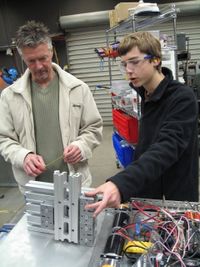Difference between revisions of "2007 Robot (Mr. Fritz)"
| Line 57: | Line 57: | ||
== References == | == References == | ||
[https://www.firstinspires.org/sites/default/files/uploads/resource_library/frc/game-and-season-info/archive/2007/2007-racknroll-kit-of-parts-checklist.pdf 2007 Kit of Parts] | [https://www.firstinspires.org/sites/default/files/uploads/resource_library/frc/game-and-season-info/archive/2007/2007-racknroll-kit-of-parts-checklist.pdf 2007 Kit of Parts] | ||
| + | |||
[https://web.archive.org/web/20080723131853/http://www.sdarobotics.org/robots.htm Archived website from 2008] | [https://web.archive.org/web/20080723131853/http://www.sdarobotics.org/robots.htm Archived website from 2008] | ||
| + | |||
[https://www.thebluealliance.com/event/2007sdc San Diego Regional TBA Page] | [https://www.thebluealliance.com/event/2007sdc San Diego Regional TBA Page] | ||
| + | |||
[https://photos.app.goo.gl/gWc7QX3ZNLgdkHUTA 2007 Build Season Photo Album] | [https://photos.app.goo.gl/gWc7QX3ZNLgdkHUTA 2007 Build Season Photo Album] | ||
| + | |||
[https://photos.app.goo.gl/3VJ5QzbejMpFiyRa6 2007 San Diego Regional Photo Album] | [https://photos.app.goo.gl/3VJ5QzbejMpFiyRa6 2007 San Diego Regional Photo Album] | ||
Revision as of 18:51, 1 June 2020
Robot Overview
The 2007 robot, Mr. Fritz, consisted of a tall tower that folded into its starting configuration, with a claw mounted to a carriage riding up and down the tower.
Build Season
Strategy
In our initial design, we stressed the ability to reach all three levels of racks, and high maneuverability. In the end, we accomplished this, but did not take into effect how important speed would be in the final game. Another thing we failed to think about was that although the higher legs are harder to get to, they are still worth the same amount of points, making them really not worth the effort.
Prototyping and Design Process
Little to no documentation exists about the prototyping process of the robot or mechanisms.
Fabrication Process
No CNC work was done on Mr. Fritz. All machining was done with hand tools and manual machines. Materials used were 45x90mm Bosch extruded aluminum, the AndyMark KOP Chassis, and billet aluminum.
Mechanism Details
Chassis and Drivetrain
Fritz used the kit of parts chassis from AndyMark, driven by two CIM motors driven through BaneBots P80 planetary gearboxes and #35 chain to four Andymark 6" wheels, located at the front of the robot. The rear of the robot had two passive casters.
Tower
The tower of the robot was roughly 9' tall made of weight-saved Bosch aluminum extrusion. Along the side of the tower was a rack gear for the carriage to ride up and down on. To fit in the height constraint, the tower started the match folded, and the carriage pushed the tower up. A gas shock assisted the tower and a latch held it in place.
Carriage
The carriage was also made of Bosch extrusion and rode on three linear bearings. It was driven by an AndyMark 9015 motor pushing a pinion along the tower's rack.
Claw
The claw had a chassis made of Bosch extrusion with jaws made of aluminum wrapped in grip tape. The claw was actuated with a lead screw driven by an AndyMark 9015 motor.
Performance
By The Numbers
Rating Metrics
OPR: 33.2 (12th of 46 teams at the San Diego Regional)
Elo: 1473 (618th of 1270 teams globally)
Competition Results
| Event | Quals Record | Rank | Alliance Selection | Playoffs Record | Awards |
|---|---|---|---|---|---|
| San Diego Regional | 5-5-0 | 24th of 46 | Not Picked | Not Picked | none |
Successes
The robot was able to drive and score, and successfully competed at our first FRC event. As a rookie year metric, this was successful.
Failures
The carriage is almost unbearably slow, limiting our scoring throughout the event. In one match the carriage drove off the top of the tower, falling onto the robot. In another match, the robot fell over due to the top-heavy nature of the robot. In an average match, the end-game of lifting another robot was more likely to win the match than scoring tubes was.
Lessons Learned
- The first lesson carried forward is that speed is make-or-break in FRC. A scoring action can't take 30 seconds on its own.
- Center-of-mass matters. A robot can't fall over every time it accelerates.
- Pay attention to the relative point values of different scoring actions. What actions are worth the most points for the least effort?




